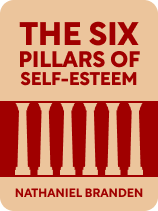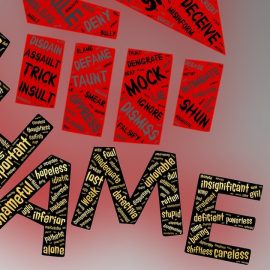

This article is an excerpt from the Shortform book guide to "The Six Pillars of Self-Esteem" by Nathaniel Branden. Shortform has the world's best summaries and analyses of books you should be reading.
Like this article? Sign up for a free trial here .
Are you looking for The Six Pillars of Self-Esteem exercises? How can you put the book’s lessons into practice?
In his book The Six Pillars of Self-Esteem, psychotherapist and self-esteem expert Nathaniel Branden describes what he believes are the key components of self-esteem: 1) Living With Awareness, 2) Accepting Yourself, 3) Taking Responsibility, 4) Asserting Yourself, and 5) Living Intentionally. He explains how each pillar contributes to self-esteem and provides practical strategies for improving your self-esteem by practicing the six pillars or categories of behavior.
Here are some reflection prompts and exercises that will help you consider the book’s lessons in the context of your own life.
The Six Pillars of Self-Esteem Exercises
In the modern world, most of us assume that we must have good self-esteem in order to be psychologically healthy. But what, exactly, is self-esteem, and how do you improve it?
In The Six Pillars of Self-Esteem, psychotherapist Nathaniel Branden challenges the prevailing assumption that self-esteem is unconditional love for yourself. Instead, he argues that your self-esteem depends on your behavior—and that only by behaving according to certain tenets, or pillars, can you improve your self-esteem. He also examines the role external influences play on your self-esteem, and how you can influence others’ self-esteem with the right behaviors.
The following The Six Pillars of Self-Esteem exercises will help you consider each pillar in the context of your own life.
Pillar #1: Living With Awareness
How can you live with greater awareness? Branden recommends sentence-completion exercises, which is a tool used in therapy and in psychological research. For two weeks, when you wake up, brainstorm six to 10 endings to prompts, or “sentence stems,” like the ones listed below. These endings don’t need to be unique or meaningful, just grammatically correct. Write quickly without self-editing, spending no more than 10 minutes on the exercise. (Shortform note: We’ve included a selection of Branden’s full list of sentence stems for this exercise. He has several more in his books, as well as on his Twitter feed.)
- To me, living consciously means…
- If I am a little more aware of my activities today…
- If I am more aware of how I relate to others today…
Don’t review your answers. When you finish, go about your day as normal. Then, each weekday evening, write six to 10 endings to sentence stems like the ones below.
- When I reflect on how I would feel if I lived more consciously…
- When I reflect on what happens when I am a little more aware of my activities…
- When I reflect on what happens when I am a little more aware of my relationships…
Don’t re-read any of your answers during the week, and don’t worry about repeating some answers. Each weekend, review your weekday writing and write at least six endings to the following prompt:
- If any of what I wrote this week is true, it would be helpful if I…
Branden contends that completing these exercises will naturally improve your self-esteem. He explains that we all have a well of knowledge we can’t immediately access. Completing these prompts allows us to tap into that well: Knowing you have to reflect each day on how greater awareness would improve your life increases how aware you are, improving your self-esteem.
Branden believes that once you complete the two-week program, you’ll have a solid understanding of how sentence completion works. You can then develop your own prompts to improve your consciousness in areas where you’re struggling with awareness.
Pillar #2: Accepting Yourself
Branden recommends a five-week writing program to help you learn to accept yourself.
Follow the instructions listed below every weekday morning and evening. Then, each weekend, review your answers and write six to 10 answers to the following prompt: “If any of what I wrote this week is true, it might be helpful if I…”
Week 1
- Mornings: Create and answer four sentence stems that address what accepting yourself means to you, what happens when you accept or reject your body, and what happens if you accept your conflicts.
- Evenings: Create and answer five sentence stems that address what happens when you reject your conflicts, what happens when you accept or reject your feelings, and what happens when you accept or reject your thoughts.
Week 2
- Mornings: Create and answer three sentence stems that address what happens when you accept or reject your actions and what you are starting to notice.
- Evenings: Create and answer three sentence stems that address what happens when you face the reality of your strengths and shortcomings and what happens when you accept or reject your fears.
Week 3
- Mornings: Create and answer four sentence stems that address what happens when you accept or reject your pain and what happens when you accept or reject your anger.
- Evening: Create and answer four sentence stems that address what happens when you accept or reject your sexuality and what happens when you accept or reject your excitement.
Week 4
- Mornings: Create and answer three sentence stems that address what happens when you accept or reject your joy, and what would happen if you were more willing to face your reality.
- Evenings: Create and answer two sentence stems that address what would happen if you were to become more aware of your fears or pain.
Week 5
- Mornings: Create and answer four sentence stems that address what would happen if you were to become more aware of your anger, your sexuality, your excitement, and your joy.
- Evenings: Create and answer three sentence stems that address what happens when you don’t accept yourself, what would happen if you accepted things you didn’t want to admit, and what you’re starting to understand.
Pillar #3: Taking Responsibility
To take more responsibility in your life, Branden recommends a nine-week sentence completion program.
Every weekday, follow the instructions listed below. Then, each weekend, review your answers and write six to 10 answers to the following: “If any of what I wrote this week is true, it might be helpful if I…”
Week 1: Create and answer four sentence stems that address what taking responsibility means to you, how you feel about taking responsibility for yourself, and what happens when you do or don’t take responsibility for yourself.
Week 2: Create and answer four sentence stems that address what happens when you do or don’t take responsibility for your goals, what would happen if you took responsibility for your relationships, and in what ways you occasionally behave passively.
Week 3: Create and answer three sentence stems that address what would happen if you took more responsibility for ideas your parents taught you and for your acceptance or rejection of those ideas and what would happen if you were more aware of the ideas that drive you.
Week 4: Create and answer four sentence stems that address what happens when you do or don’t take responsibility for your happiness and what happens when you do or don’t take responsibility for who you choose to spend time with.
Week 5: Create and answer four sentence stems that address what happens when you do or don’t take responsibility for what you say to others, what happens if you grow more aware of what you say to yourself, and what happens when you take responsibility for what you say to yourself.
Week 6: Create and answer four sentence stems that address the ways in which you increase your helplessness, depression, and anxiety, and what happens when you take responsibility for the behaviors that increase your helplessness.
Week 7: Create and answer five sentence stems that address what happens when you take responsibility for the behaviors that increase your depression and anxiety, what would happen if you felt prepared to face your responsibility, what you have trouble acknowledging, and what happens when you take responsibility for how you live.
Week 8: Create and answer four sentence stems that address the situations in which you feel like you’re taking the most or least responsibility and what would happen if you could live for yourself and ignore others’ expectations of you.
Week 9: Create and answer four sentence stems that address what would happen if you admitted that you could alter your own life, what would happen if nobody could save you from your own life, what would happen if you took responsibility for your life, and what you’re starting to notice.
Pillar #4: Asserting Yourself
Branden recommends the following four-week sentence-completion program to improve your ability to assert yourself.
Every weekday morning and evening, follow the instructions listed below. Then, each weekend, review your answers and write six to 10 answers to the following prompt: “If any of what I wrote this week is true, it might be helpful if I…”
Week 1: Create and answer four sentence stems that address what asserting yourself means to you, what would happen if you asserted yourself a little more today, what would happen if you were taught that your desires mattered, and what would happen if you behaved as they did.
Week 2: Create and answer four sentence stems that address what happens when you pay attention to or ignore your innermost desires, what would happen if you acted in accordance with your desires, and what would happen if you expressed yourself more regularly.
Week 3: Create and answer four sentence stems that address what happens when you ignore your views, what would happen if you expressed or ignored your desires, and what would happen if people knew your true, best self.
Week 4: Create and answer four sentence stems that address what would happen if you could access your true and best self, what happens when you convey your true self, what happens when you conceal your true self, and what would happen if you wanted a fuller life.
Pillar #5: Living Intentionally
To improve the likelihood that you’ll live intentionally, Branden recommends creating and answering several sentence stems that address questions like the ones listed below. Branden doesn’t provide a specific timeline during which you should complete these sentence stems.
- What does living intentionally mean to you?
- What would happen if you behaved more intentionally at work and with your colleagues?
- What would happen if you behaved more intentionally with your family?
- What would happen if you were more intentional about prioritizing what you want and need?
- What might be helpful if anything you wrote was true?

———End of Preview———
Like what you just read? Read the rest of the world's best book summary and analysis of Nathaniel Branden's "The Six Pillars of Self-Esteem" at Shortform .
Here's what you'll find in our full The Six Pillars of Self-Esteem summary :
- Exactly how to behave to improve your self-esteem
- Why you need to take responsibility for your life and actions
- Why so many self-esteem techniques don't work






